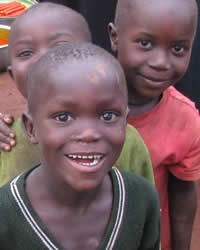Alur, Lur in Uganda

Photo Source:
Anonymous
|
Send Joshua Project a map of this people group.
|
| People Name: | Alur, Lur |
| Country: | Uganda |
| 10/40 Window: | No |
| Population: | 1,376,000 |
| World Population: | 2,911,000 |
| Primary Language: | Alur |
| Primary Religion: | Christianity |
| Christian Adherents: | 96.00 % |
| Evangelicals: | 30.00 % |
| Scripture: | Complete Bible |
| Ministry Resources: | Yes |
| Jesus Film: | Yes |
| Audio Recordings: | Yes |
| People Cluster: | Nilotic |
| Affinity Bloc: | Sub-Saharan Peoples |
| Progress Level: |
|
Introduction / History
The Alur are a Nilotic ethnic group primarily residing in the Nebbi, Zombo, and Arua districts of northwestern Uganda, as well as in the northeastern part of the Democratic Republic of the Congo (DRC), north of Lake Albert. They belong to the larger Luo group, and their language is closely related to Acholi.
According to the Alur tradition, they migrated from southern Sudan with other Luo groups, following the Nile banks, with their original homeland believed to be Rumbek, situated at the confluence of the Nile and the Bahr-el-Ghazal rivers. Most likely, they reached their current settlement by the 14th century.
Most Alur people speak the Alur language, which is closely related to Dojunam Acholi and Adhola. Some also speak Lendu or Kebu. Notably, Alur language dialects vary considerably, with the highland Alur (Okoro) speaking a slightly different dialect from the lowland Alur (Jonam).
Historically, the Alur people have been organized under chiefdoms, and their kingdom is said to have been the only one unaffected by the Ugandan ban on traditional monarchies in 1966.
What Are Their Lives Like?
Traditionally, the Alur live in grass-thatched huts with their homesteads established in the central part of their territory to help keep their territory under their control.
Work among the Alur is divided along gender lines, with men primarily responsible for farming, building, fishing, and hunting, while women manage the home, childcare, and food preparation. Family structures are patrilineal and patrilocal, with a strong emphasis on kinship and clan affiliations.
Today, Alur are settled agriculturalists cultivating crops like millet, sorghum, cassava, beans, sweet potatoes, and pumpkins as their main food crops. They also cultivate coffee and cotton as cash crops. Alurs practice herding with cattle, goats, and chickens as their major animals. They also practice fishing, especially those near Lake Albert and the Nile River.
While tradition persists, Alur men and women are increasingly involved in diverse professions like teaching, shopkeeping, and healthcare.
What Are Their Beliefs?
The Alur people traditionally practice a form of ancestor worship centered around the concept of "Jok", which can be understood as a Supreme Being or a collection of spiritual forces. While the nature of Jok can be both personal and impersonal, worship is often prompted by misfortunes and believed to be necessary to appease these spiritual entities.
Today, over 96.0% Alur people are Christians, with significant populations adhering to Roman Catholicism and various Protestant denominations. A significant minority of Alur are Muslims.
What Are Their Needs?
The Alur people have access to a complete Bible in their language, as well as the JESUS Film in Alur.
Although a significant number of Alur individuals have embraced Christianity, there is a notable lack of missional movement among them. To fulfil their potential, they require mobilization and equipping for mission work.
Additionally, the Alur people would benefit from improvements in their economic activities, such as fishing, crop production, and animal husbandry.
Some traditional cultural practices persist among many Alur people, including within the Christian community.
Prayer Points
Pray that Alur followers of Christ will grasp God's heart for all peoples and commit to fulfilling his mission.
Pray that the Alur people will turn away from cultural worship and instead worship the one true God, the Creator of all.
Pray that the Lord will bless the endeavors of the Alur people, and that they will acknowledge his blessings in all their works.
Pray that the Lord will raise up a generation of devoted followers who are passionate and committed to worshiping him in purity and holiness, who will continue to reach their own people, their country Uganda, and the ends of the world.